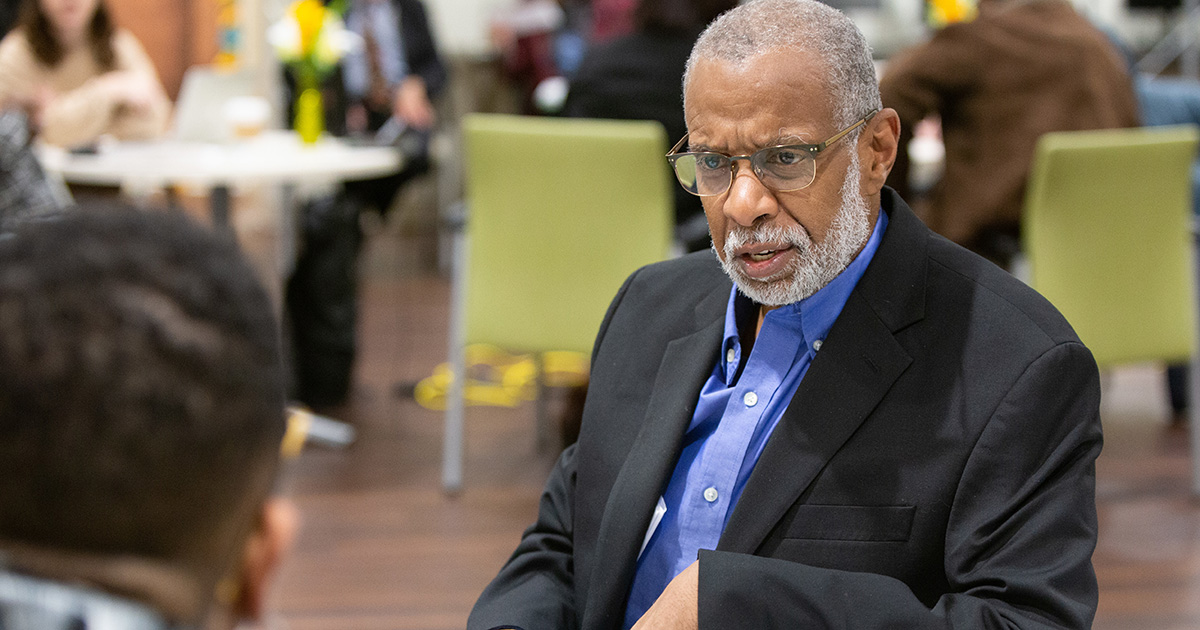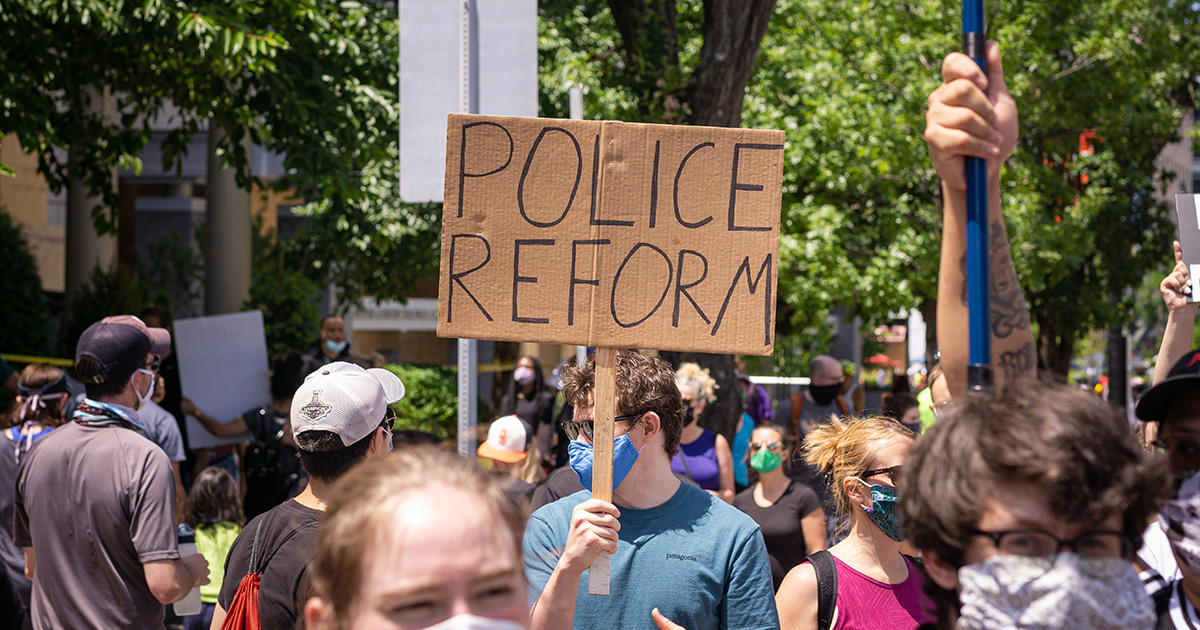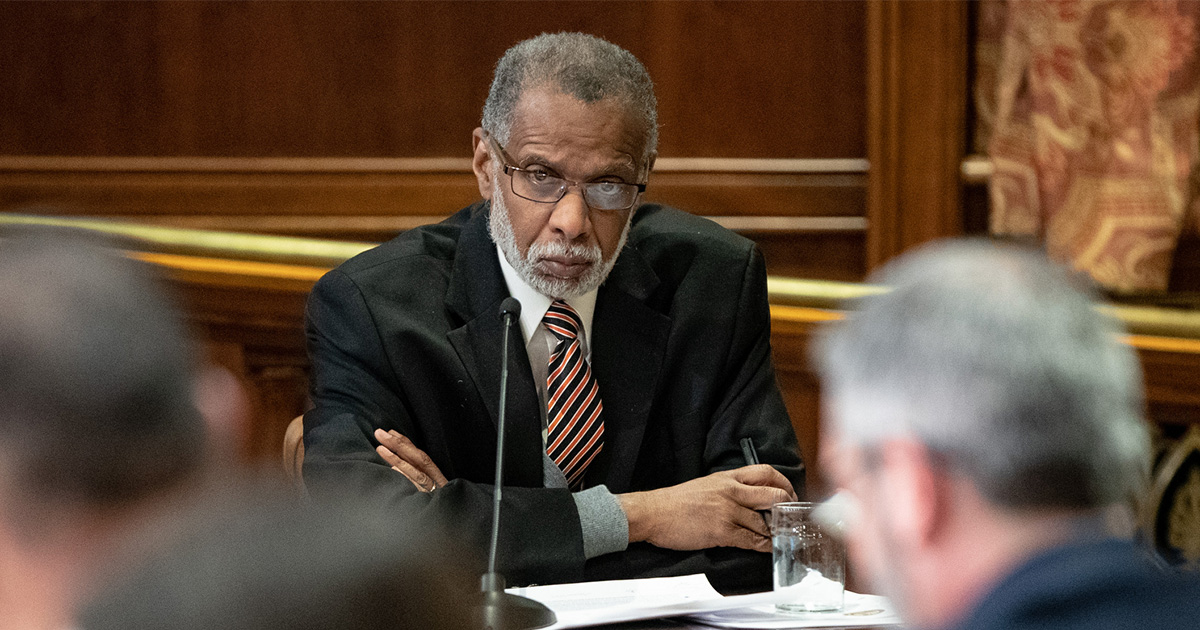Justicia racial
Para exigir cambios en Pensilvania, envía el mensaje BLM al 787753.
legislación
SB 458 - Formación y responsabilidad
Mejoras de la Comisión de Educación y Formación de Agentes de Policía Municipal:
- Exigir nuevos elementos de formación para el uso de la fuerza letal, la actuación policial orientada a la comunidad, los métodos de desescalada, la interacción con comunidades diversas y la prevención de prejuicios. En la actualidad, todos estos elementos son obligatorios en cierta medida, pero hay que hacer más. También es necesario exigir que cada uno de estos elementos se incluya en los cursos de formación continua.
- Creación de una base de datos para exigir a los municipios que comuniquen y hagan un seguimiento de la información penal, disciplinaria y de investigación de cada agente de policía municipal para su uso por futuros departamentos de policía contratantes.
- Mejora de los exámenes psicológicos de los agentes que solicitan la certificación MPOETC.
- Desarrollo de directrices mínimas para que los municipios adopten para formar y dirigir departamentos de policía.
SB 611 - Fiscal Especial
Nuestro sistema de justicia penal está concebido para ser imparcial y para que los fiscales desempeñen sus funciones libres de conflictos personales o profesionales. Tenemos una legislación que sacaría la revisión y el enjuiciamiento de los incidentes de fuerza letal a manos de agentes de policía de la jurisdicción del fiscal de distrito local y lo pondría en manos de un fiscal especial.
Nuestro proyecto de ley exigiría que el Fiscal General nombrara a un fiscal especial siempre que se produjera un incidente de fuerza letal en el que estuviera implicado un agente de policía. El fiscal especial actuaría como fiscal imparcial y eliminaría el conflicto percibido que un fiscal de distrito podría tener al procesar a un agente de policía local.
Nuestro proyecto de ley no pretende castigar a un agente por cumplir con su deber. Simplemente pretende proporcionar una revisión neutral de un caso cuando una persona muere a manos de un agente de policía y restablecer la debilitada confianza pública en nuestro sistema judicial. Es de esperar que los fiscales y la policía compartan una estrecha relación y tengan que trabajar cohesionados. Esta relación suele ser productiva y es importante para luchar contra la delincuencia. Sin embargo, a los ojos de muchos ciudadanos, cuando un agente se ve implicado en un posible delito, esta relación puede enturbiar al investigador.
SB 1202 - Prohibición de las llaves de estrangulamiento y la asfixia postural
Las muertes de George Floyd y Eric Garner, que murieron a manos de la policía utilizando métodos cuestionables de restricción, ha dejado claro que tenemos que prohibir las llaves de estrangulamiento de cualquier tipo. Aunque muchos departamentos han prohibido las llaves de estrangulamiento, esto no ha impedido su uso. Además, a muchas fuerzas de seguridad y personal sanitario se les enseña a evitar sujetar a las personas de una forma que pueda provocar asfixia postural.
La Asociación de Jefes de Policía acredita a los cuerpos de seguridad de Pensilvania. En 2001, la Asociación introdujo el proceso de acreditación de las fuerzas del orden de Pensilvania para los departamentos de policía, con el fin de crear prácticas policiales normalizadas entre los organismos acreditados. Este tipo de restricciones están prohibidas para los departamentos acreditados. Sin embargo, según la Comisión de Delincuencia y Crimen de Pensilvania, sólo 118 de los más de 1.000 cuerpos de seguridad del Estado están acreditados.
Nuestra legislación prohibiría el uso de la llave de estrangulamiento estándar y definiría la asfixia posicional como cualquier acción que inhiba la respiración o el flujo de sangre al cerebro debido a la posición física.
Haywood sobre la justicia racial
Criminal Justice Caucus Co-Chairs Share Intentions to Address Bipartisan Public Safety Reforms
HARRISBURG – Junio 11, 2020 – Senator Art Haywood (D-4) and Senator Camera Bartolotta (R-46), Co-Chairs of the Pennsylvania State Senate Criminal Justice Reform Caucus, issued today the following statement regarding their intentions to collaborate on bipartisan...
PA Senate Democrats Announce Comprehensive Police Reform Legislation
HARRISBURG – Junio 10, 2020 – Today, members of the Pennsylvania Senate Democratic Caucus announced plans for a comprehensive package of legislation to reform policing in Pennsylvania. Two years ago, members of the caucus introduced police and community relations...
Senator Haywood Reintroduces Special Prosecutor Legislation
Harrisburg – Mayo 1, 2019 – State Senator Art Haywood (D-Montgomery/Philadelphia) released the following statement after reintroducing his legislation calling for independent investigation of police involved shootings today: “The acquittal of the officer who shot...
Participe
Llame a su legislador
Para organizaciones
Poner fin a la política policial que fomenta la injusticia y aumentar el salario mínimo a 15 $/hora es una solución beneficiosa para los miembros de la comunidad, los trabajadores y la Commonwealth. Aquí tienes un ejemplo de guión que puedes utilizar.
Ejemplo de guión de llamada:
Gracias por atender mi llamada. Hola, soy __________ de [nombre de la organización]. Representamos a [X] número de personas en su distrito. Llamo para solicitar una reunión con usted para debatir una posible legislación que exigiría investigaciones independientes de los asesinatos en los que interviene la policía, cambios en las políticas policiales sobre el uso de la fuerza letal y el aumento del salario mínimo estatal a 15 dólares por hora. ¿Podemos programar una reunión con su oficina la próxima semana, si no antes, para discutir estas importantes cuestiones más a fondo?
Si el legislador no está disponible para reunirse pero sí lo está un miembro de su personal, siga el mismo procedimiento y organice una reunión con el Jefe de Personal de la oficina.
Para los electores
Aquí tiene un ejemplo de guión que puede utilizar. Asegúrate de dar tu nombre e identificar que eres un elector.
Ejemplo de guión de llamada:
Hola, soy __________. Soy residente de [municipio y/o distrito local]. Llamo para expresar mi apoyo a la legislación que exige investigaciones independientes de los asesinatos policiales, cambios en las políticas policiales sobre el uso de la fuerza letal y el aumento del salario mínimo estatal a 15 dólares por hora. Poner fin a las políticas policiales que fomentan la injusticia y aumentar el salario mínimo a 15 dólares por hora es una victoria para los miembros de la comunidad, los trabajadores y la Commonwealth. Tenemos que poner fin a las políticas que han contribuido a la injusticia sistémica. Le pido a [Legislador Estatal] que apoye estas propuestas legislativas. Gracias por atender mi llamada. [Si deja un mensaje de voz: por favor, deje su dirección completa y código postal para asegurar que su llamada se contabiliza como un constituyente]. [Complemento opcional]
Las historias personales son la forma más eficaz de defensa. Explica por qué estos temas son importantes para ti o para alguien que conozcas.
El gobernador Wolf firma los proyectos de reforma de la policía
Declaración de los demócratas del Senado de Pensilvania sobre la equidad racial
Como muchos de ustedes, en el Grupo Demócrata del Senado de Pensilvania estamos luchando con la muerte de George Floyd y trabajando para entender qué es la equidad y cómo la entienden las distintas personas. Los sucesos de Minneapolis representan, por desgracia, un patrón de incidentes violentos derivados de la incomprensión fundamental de lo que significa la equidad: desde el linchamiento de Emmett Till hasta la paliza a Rodney King, pasando por los tiroteos de Breonna Taylor, Tamir Rice y Trayvon Martin. Todos ellos fueron víctimas de una sociedad injusta y desigual que no ve la humanidad de cada persona, independientemente de su raza o etnia.
Como nación, nunca seremos capaces de ofrecer equidad o justicia a una familia o a una comunidad si no comprendemos su experiencia vivida. Sintiendo la misma indignación moral tras presenciar múltiples sucesos similares en los últimos años, muchos de nosotros nos unimos a ustedes en las calles para protestar pacíficamente y llamar a la acción. Lamentablemente, muchos de nosotros también hemos sido testigos de cómo estas concentraciones pacíficas y constitucionales se tornaban oscuras, al ser suplantados los mensajes de paz y unidad por personas que buscaban sembrar el caos y la discordia. Hemos condenado el robo y el vandalismo al tiempo que protegíamos nuestros propios hogares y comunidades.
Nadie que crea en la equidad de los seres humanos puede justificar lo que le ocurrió a George Floyd, ni la respuesta desproporcionada con la que se respondió a muchas protestas pacíficas en los últimos días. Tampoco puede estar en desacuerdo nadie que haya examinado el estado de nuestra unión en los últimos años con que se ha permitido que la desigualdad racial supure y crezca en todo el país. Desde la aplicación de la ley hasta la educación y la sanidad, no se puede permitir que las instituciones de gobierno cierren voluntariamente los ojos ante la difícil situación de los demás. Sabemos que el racismo, los prejuicios y la intolerancia no tienen cabida en la política pública, y debemos actuar como tales. Este momento de tragedia nos ha dado otra oportunidad para desmantelar y reemplazar los mecanismos que perpetuamente conducen a resultados negativos para tantos. Los demócratas del Senado de Pensilvania siguen persiguiendo agresivamente el cambio legislativo para lograr la equidad frente a la injusticia. Nuestra humanidad nos sacará de este momento de profundo dolor, y podemos avanzar hacia un futuro en el que todos sean tratados con la dignidad que merecen.



